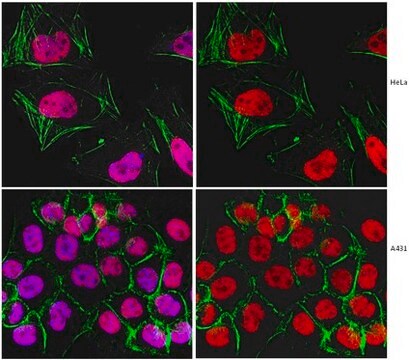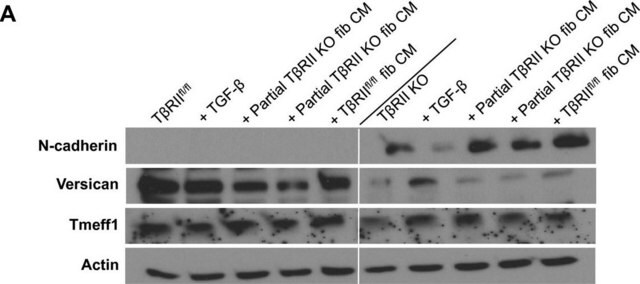おすすめの製品
由来生物
rabbit
品質水準
クローン
polyclonal
精製方法
affinity chromatography
化学種の反応性
rat, human, mouse
メーカー/製品名
ChIPAb+
Upstate®
テクニック
ChIP: suitable
dot blot: suitable
western blot: suitable
NCBIアクセッション番号
UniProtアクセッション番号
輸送温度
dry ice
関連するカテゴリー
詳細
All ChIPAb+ antibodies are individually validated for chromatin precipitation, every lot, every time. Each ChIPAb+ antibody set includes control primers (tested every lot by qPCR) to biologically validate your IP results in a locus-specific context. The qPCR protocol and primer sequences are provided, allowing researchers to validate ChIP protocols when using our antibody in their chromatin context. Each set also includes a negative control antibody to ensure specificity of the ChIP reaction.
The ChIPAb+ Dimethyl-Histone H4 (Arg3) Symmetric set includes the Dimethyl-Histone H4 (Arg3) Symmetric antibody, a Normal Rabbit IgG, and control primers which amplify a 110 bp region of ChIP Primers, human β-globin. The Dimethyl-Histone H4 (Arg3) Symmetric and negative controls are supplied in a scalable "per ChIP" reaction size and can be used to functionally validate the precipitation of Dimethyl-Histone H4 (Arg3) Symmetric-associated chromatin.
The ChIPAb+ Dimethyl-Histone H4 (Arg3) Symmetric set includes the Dimethyl-Histone H4 (Arg3) Symmetric antibody, a Normal Rabbit IgG, and control primers which amplify a 110 bp region of ChIP Primers, human β-globin. The Dimethyl-Histone H4 (Arg3) Symmetric and negative controls are supplied in a scalable "per ChIP" reaction size and can be used to functionally validate the precipitation of Dimethyl-Histone H4 (Arg3) Symmetric-associated chromatin.
Histones are highly conserved proteins that serve as the structural scaffold for the organization of nuclear DNA into chromatin. The four core histones, H2A, H2B, H3, and H4, assemble into an octamer (2 molecules of each). Histones are modified post-translationally by the actions of enzymes in both the nucleus and cytoplasm. These modifications, which include acetylation, phosphorylation, methylation, and ubiquitin-ation, occur predominantly on the N-terminal and C-terminal tails that extend beyond the nucleosome core particle. Arginine modifications of histones proteins are mediated by two classes of protein arginine methyltransferases (PRMTs), class I and II. Class I PRMTs place two methyl groups on the one nitrogen atom of the arginine guanidino group, resulting in an asymmetric modification. In contrast class II PRMTs place two methyl groups on two nitrogen atoms of the guanidino group producing a symmetric dimethylation. Although there are exceptions, asymmetric modifications are typically associated with transcription activation while symmetric modifications are most commonly associated with transcriptional repression.
特異性
Broad species cross-reactivity expected based on sequence similarity.
This antibody recognizes Histone H4 symmetrically dimethylated at Arg3.
免疫原
Epitope: Dimethylated Arg3
KLH-conjugated linear peptide corresponding to human Histone H4 when symmetrically dimethylated at Arg3.
アプリケーション
Research Category
エピジェネティクス及び核内機能分子
エピジェネティクス及び核内機能分子
Research Sub Category
ヒストン
ヒストン
Chromatin Immunoprecipitation:
Representative lot data.
Sonicated chromatin prepared from HeLa cells (1 X 10E6 cell equivalents per IP) were subjected to chromatin immunoprecipitation using 1 µg of either Normal rabbit IgG or 0.7 µg of Anti-Dimethyl-Histone H4 (Arg3) Symmetric and the Magna ChIP A Kit (Cat. # 17-610). Successful immunoprecipitation of Dimethyl-Histone H4 (Arg3) Symmetric associated DNA fragments was verified by qPCR using ChIP Primers, human β-globin as a positive locus, and GAPDH promoter primers (22-004) as a negative locus. (Figure 2). Data is presented as percent input of each IP sample relative to input chromatin for each amplicon and ChIP sample as indicated.
Please refer to the EZ-Magna ChIP A (Cat. # 17-408) or EZ-ChIP (Cat. # 17-371) protocol for experimental details.
Western Blot Analysis:
Representative lot data.
HeLa acid extract (Lane 1) and recombinant Histone H4 (Lane 2) were probed with Anti-Dimethyl-Histone H4 (Arg3) Symmetrical (0.1μg/mL). Proteins were visualized using a Donkey Anti-Rabbit IgG secondary antibody conjugated to HRP and a chemiluminescence detection system.
Arrow indicates Histone H4 (~13 kDa). (Figure 3).
Note: An uncharacterized band at ~58 kDa has been observed in some lysates.
Dot Blot Analysis:
Representative lot data.
Histone peptides with various modifications (see table below) were probed with Anti-Dimethyl-Histone H4 (Arg3) Symmetrical (1:2,000 dilution). Proteins were visualized using a Donkey Anti-Rabbit IgG secondary antibody conjugated to HRP and a chemiluminescence detection system. (Figure 4). See table below.
Immunocytochemistry Analysis:
Representative lot data.
Confocal fluorescent analysis of A431 and HeLa cells using Anti-Dimethyl-Histone H4 (Arg3) Symmetrical (Red). Actin filaments have been labeled with Alexa Fluor 488 dye Phalloidin (Green). Nucleus is stained with DAPI (Blue). This antibody positively stains the nucleus. (Figure 5).
Representative lot data.
Sonicated chromatin prepared from HeLa cells (1 X 10E6 cell equivalents per IP) were subjected to chromatin immunoprecipitation using 1 µg of either Normal rabbit IgG or 0.7 µg of Anti-Dimethyl-Histone H4 (Arg3) Symmetric and the Magna ChIP A Kit (Cat. # 17-610). Successful immunoprecipitation of Dimethyl-Histone H4 (Arg3) Symmetric associated DNA fragments was verified by qPCR using ChIP Primers, human β-globin as a positive locus, and GAPDH promoter primers (22-004) as a negative locus. (Figure 2). Data is presented as percent input of each IP sample relative to input chromatin for each amplicon and ChIP sample as indicated.
Please refer to the EZ-Magna ChIP A (Cat. # 17-408) or EZ-ChIP (Cat. # 17-371) protocol for experimental details.
Western Blot Analysis:
Representative lot data.
HeLa acid extract (Lane 1) and recombinant Histone H4 (Lane 2) were probed with Anti-Dimethyl-Histone H4 (Arg3) Symmetrical (0.1μg/mL). Proteins were visualized using a Donkey Anti-Rabbit IgG secondary antibody conjugated to HRP and a chemiluminescence detection system.
Arrow indicates Histone H4 (~13 kDa). (Figure 3).
Note: An uncharacterized band at ~58 kDa has been observed in some lysates.
Dot Blot Analysis:
Representative lot data.
Histone peptides with various modifications (see table below) were probed with Anti-Dimethyl-Histone H4 (Arg3) Symmetrical (1:2,000 dilution). Proteins were visualized using a Donkey Anti-Rabbit IgG secondary antibody conjugated to HRP and a chemiluminescence detection system. (Figure 4). See table below.
Immunocytochemistry Analysis:
Representative lot data.
Confocal fluorescent analysis of A431 and HeLa cells using Anti-Dimethyl-Histone H4 (Arg3) Symmetrical (Red). Actin filaments have been labeled with Alexa Fluor 488 dye Phalloidin (Green). Nucleus is stained with DAPI (Blue). This antibody positively stains the nucleus. (Figure 5).
This ChIPAb+ Dimethyl-Histone H4 (Arg3) Symmetric -ChIP Validated Antibody & Primer Set conveniently includes the antibody & the specific control PCR primers.
包装
25 assays per set. Recommended use: 0.7 μg of antibody per chromatin immunoprecipitation (dependent upon biological context).
品質
Chromatin Immunoprecipitation:
Representative lot data.
Sonicated chromatin prepared from HeLa cells (1 X 10E6 cell equivalents per IP) were subjected to chromatin immunoprecipitation using 1 µg of either Normal Rabbit IgG, or 0.7 µg of Anti-Dimethyl-Histone H4 (Arg3) Symmetric and the Magna ChIP® A Kit (Cat. # 17-610). Successful immunoprecipitation of Dimethyl-Histone H4 (Arg3) Symmetric associated DNA fragments was verified by qPCR using ChIP Primers, human β-globin (Figure 1).
Please refer to the EZ-Magna ChIP A (Cat. # 17-408) or EZ-ChIP (Cat. # 17-371) protocol for experimental details.
Representative lot data.
Sonicated chromatin prepared from HeLa cells (1 X 10E6 cell equivalents per IP) were subjected to chromatin immunoprecipitation using 1 µg of either Normal Rabbit IgG, or 0.7 µg of Anti-Dimethyl-Histone H4 (Arg3) Symmetric and the Magna ChIP® A Kit (Cat. # 17-610). Successful immunoprecipitation of Dimethyl-Histone H4 (Arg3) Symmetric associated DNA fragments was verified by qPCR using ChIP Primers, human β-globin (Figure 1).
Please refer to the EZ-Magna ChIP A (Cat. # 17-408) or EZ-ChIP (Cat. # 17-371) protocol for experimental details.
ターゲットの説明
~13 kDa observed. Crossreacting band at ~58 kDa has been observed in some lysates.
物理的形状
Affinity purified
Anti-Dimethyl-Histone H4 (Arg3) Symmetric (rabbit polyclonal). One vial containing 17.5 µg of purified rabbit polyclonal in buffer containing 0.1 M Tris-Glycine (pH 7.4), 150 mM NaCl with 0.05% sodium azide before the addition of glycerol to 30%. Store at -20°C.
Concentration: 0.7 µg/µL
Normal Rabbit IgG. One vial containing 125 µg of Rabbit IgG in 125 µL of storage buffer containing 0.05% sodium azide. Store at -20°C.
ChIP Primers, human β-globin. One vial containing 75 μL of 5 μM of each primer specific for the human β-globin promoter. Store at -20°C.
FOR: AGG ACA GGT ACG GCT GTC ATC
REV: TTT ATG CCC AGC CCT GGC TC
Concentration: 0.7 µg/µL
Normal Rabbit IgG. One vial containing 125 µg of Rabbit IgG in 125 µL of storage buffer containing 0.05% sodium azide. Store at -20°C.
ChIP Primers, human β-globin. One vial containing 75 μL of 5 μM of each primer specific for the human β-globin promoter. Store at -20°C.
FOR: AGG ACA GGT ACG GCT GTC ATC
REV: TTT ATG CCC AGC CCT GGC TC
保管および安定性
Stable for 1 year at -20°C from date of receipt. Handling Recommendations: Upon first thaw, and prior to removing the cap, centrifuge the vial and gently mix the solution. Aliquot into microcentrifuge tubes and store at -20°C. Avoid repeated freeze/thaw cycles, which may damage IgG and affect product performance.
Note: Variability in freezer temperatures below -20°C may cause glycerol containing solutions to become frozen during storage.
Note: Variability in freezer temperatures below -20°C may cause glycerol containing solutions to become frozen during storage.
アナリシスノート
Control
Includes normal rabbit IgG and primers specific for human β-globin.
Includes normal rabbit IgG and primers specific for human β-globin.
その他情報
Concentration: Please refer to the Certificate of Analysis for the lot-specific concentration.
法的情報
MAGNA CHIP is a registered trademark of Merck KGaA, Darmstadt, Germany
UPSTATE is a registered trademark of Merck KGaA, Darmstadt, Germany
免責事項
Unless otherwise stated in our catalog or other company documentation accompanying the product(s), our products are intended for research use only and are not to be used for any other purpose, which includes but is not limited to, unauthorized commercial uses, in vitro diagnostic uses, ex vivo or in vivo therapeutic uses or any type of consumption or application to humans or animals.
保管分類コード
10 - Combustible liquids
適用法令
試験研究用途を考慮した関連法令を主に挙げております。化学物質以外については、一部の情報のみ提供しています。 製品を安全かつ合法的に使用することは、使用者の義務です。最新情報により修正される場合があります。WEBの反映には時間を要することがあるため、適宜SDSをご参照ください。
Jan Code
17-10250:
試験成績書(COA)
製品のロット番号・バッチ番号を入力して、試験成績書(COA) を検索できます。ロット番号・バッチ番号は、製品ラベルに「Lot」または「Batch」に続いて記載されています。
Zhenyu Zhou et al.
Cancer science, 115(5), 1587-1601 (2024-03-05)
Both lysine and arginine methyltransferases are thought to be promising therapeutic targets for malignant tumors, yet how these methyltransferases function in malignant tumors, especially hepatocellular carcinoma (HCC), has not been fully elucidated. Here, we reported that SMYD4, a lysine methyltransferase
ライフサイエンス、有機合成、材料科学、クロマトグラフィー、分析など、あらゆる分野の研究に経験のあるメンバーがおります。.
製品に関するお問い合わせはこちら(テクニカルサービス)








